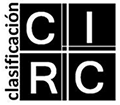Orson Welles, John Huston y El extraño: la otra cara del Holocausto = Orson Welles, John Huston and The stranger: the other side of the Holocaust
DOI:
https://doi.org/10.18002/ehf.v0i39.5086Keywords:
La pequeña ciudad estadounidense, Holocausto, cine clásico de Hollywood, John Huston, Orson Welles, Small-town America, Hollywood Classical Cinema, HolocaustAbstract
Con este trabajo se busca demostrar que El extraño de Orson Welles, una obra denostada por el propio director, al considerarla un mero producto comercial, se trata, sin embargo, de una de sus producciones ideológicamente más ambiciosas. A partir de los escritos periodísticos de Welles y del guion original que éste elabora con John Huston, este trabajo analiza cómo la película supone para Welles un medio para mostrar la responsabilidad que han tenido las instituciones y la opinión pública norteamericana en relación al Holocausto.
This work argues that Orson Welles’s The Stranger, in spite of being despised by the author as a mere commercial film, it is, in fact, one of his most ambitious productions in ideological terms. Drawing upon Orson Welles’s journalism and his original film script written in collaboration with John Huston, this work explores how Welles uses the film to show the responsibility of American institutions and public opinion regarding the Holocaust.
Downloads
Métricas alternativas
References
Agee, J. (2005): Film Writing and Selected Journalism, New York, Library of America.
Berg, A. S. (1998): Lindbergh, London, Macmillan.
Berthomé, J.; Thomas, F. (2007): Orson Welles en acción, Madrid: Akal.
Biesen, S. C. (2005): Black Out: World War II and the Origins of Film Noir, Baltimore, The Johns Hopkins University Press.
Buñuel, L. (2005): Mi último respiro, Barcelona: Debolsillo.
Capra, F. (1997): The Name Above the Title: An Autobiography, Boston: Da Capo Press.
Carr, S. A. (2008): “Staying for Time: The Holocaust and Atrocity Footage in American Public Memory” en C. Lee (ed.) Violating Time: History, Memory, and Nostalgia in Cinema, New York, Continuum, 57-69.
Crowther, B. (1946): “Review of The Stranger”, The New York Times, July 11, 18.
Denby, D. (2014): “Hollywood at War. Five Major Directors with a Mission” http://www.newyorker.com/magazine/2014/03/17/hollywood-at-war (Consultado el 14-02-2017).
Douglas, L. (1995): “Film as Witness: Screening Nazi Concentration Camps before the Nuremberg Tribunal”, The Yale Law Journal, 105, 449-481.
Emerson, R. W. (1906): Essays and English Traits, Cambridge, MA, Harvard University Press.
Friedrich, O. (1987): City of Nets. A Portrait of Hollywood in the 1940’s, New York, Harper Perennial.
Huston, J. (1980): An open book, New York, Knopf.
Koppes, C. R.; Black G. D. (1990): Hollywood Goes to War: How Politics, Profits and Propaganda Shaped World War II Movies, Berkley, Los Angeles: University of California Press.
Kracauer, S. (2012): Siegfried Kracauer’s American Writings: Essays on Film and Popular Culture, Berkley, Los Angeles, London, University of California Press.
Lipstadt, D. E. (1990): “America and the Holocaust”, Modern Judaism, 10, 283-296.
McGilligan, P. (2003): Alfred Hitchcock: A Life in Darkness and Light, New York, Harper Collins.
Mereghetti, P. (2011): Maestros del cine: Orson Welles, Paris, Cahiers du Cinéma.
Michalczyk, J. J. (2014): Filming the End of the Holocaust: Allied Documentaries, Nuremberg and the Liberation of the Concentration Camps, London, New Delhi, New York, Sidney, Bloomsbury.
Naremore, J. (1989): The Magic World of Orson Welles (new and revised edition), Dallas, Southern Methodist University Press.
Shandley, R. R. (2001): Rubble Films: German Cinema in the Shadow of the Third Reich, Philadelphia: Temple University Press.
Simone, S. P. (1985): Hitchcock as Activist: Politics and the War Films, Ann Arbor, MI, U.M.I. Research Press.
Simsolo, N. (2009): El cine negro, Madrid, Alianza Editorial.
Sterritt, D. (1993): The Films of Alfred Hitchcock, Cambridge, Cambridge University Press.
Welles, O.; Bogdanovich, P. (1988): This is Orson Welles, Boston, Da Capo Press.
Wood, M. (1975): America in the Movies or “Santa Maria, It Had Slipped My Mind”, New York, Delta Book.
Downloads
Published
How to Cite
Issue
Section
License
Copyright (c) 2017 Alberto José Lena Ordóñez

This work is licensed under a Creative Commons Attribution-NonCommercial-ShareAlike 4.0 International License.
Los autores o autoras que publican en esta revista están de acuerdo con los siguientes términos:
- Los autores o autoras conservan los derechos de autoría de su trabajo y ceden de forma no exclusiva los derechos de explotación (reproducción, distribución, comunicación pública, transformación) a la Universidad de León, por lo que pueden establecer, por separado, acuerdos adicionales para la distribución no exclusiva de la versión de la obra publicada en la revista (por ejemplo, alojarlo en un repositorio institucional o publicarlo en un libro), con un reconocimiento de su publicación inicial en esta revista.
- Este trabajo se encuentra bajo la Creative Commons Attribution-NonCommercial-ShareAlike 4.0 International License. Puede consultarse desde aquí la versión informativa y el texto legal de la licencia.
- Se permite y se anima a los autores y autoras a difundir electrónicamente las versiones pre-print (versión antes de ser evaluada) y/o post-print (versión evaluada y aceptada para su publicación) de sus obras antes de su publicación, ya que favorece su circulación y difusión más temprana y con ello un posible aumento en su citación y alcance entre la comunidad académica.











